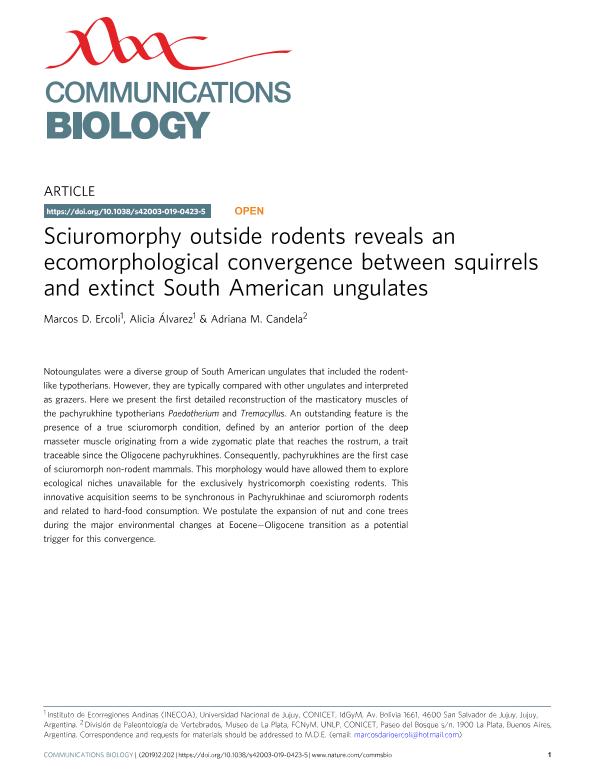Mostrar el registro sencillo del ítem
dc.contributor.author
Ercoli, Marcos Darío

dc.contributor.author
Alvarez, Alicia

dc.contributor.author
Candela, Adriana Magdalena

dc.date.available
2021-01-19T02:44:02Z
dc.date.issued
2019-06
dc.identifier.citation
Ercoli, Marcos Darío; Alvarez, Alicia; Candela, Adriana Magdalena; Sciuromorphy outside rodents reveals an ecomorphological convergence between squirrels and extinct South American ungulates; Nature Publishing Group; Communications Biology; 2; 202; 6-2019; 1-11
dc.identifier.issn
2399-3642
dc.identifier.uri
http://hdl.handle.net/11336/122982
dc.description.abstract
Notoungulates were a diverse group of South American ungulates that included the rodent-like typotherians. However, they are typically compared with other ungulates and interpreted as grazers. Here we present the first detailed reconstruction of the masticatory muscles of the pachyrukhine typotherians Paedotherium and Tremacyllus. An outstanding feature is the presence of a true sciuromorph condition, defined by an anterior portion of the deep masseter muscle originating from a wide zygomatic plate that reaches the rostrum, a trait traceable since the Oligocene pachyrukhines. Consequently, pachyrukhines are the first case of sciuromorph non-rodent mammals. This morphology would have allowed them to explore ecological niches unavailable for the exclusively hystricomorph coexisting rodents. This innovative acquisition seems to be synchronous in Pachyrukhinae and sciuromorph rodents and related to hard-food consumption. We postulate the expansion of nut and cone trees during the major environmental changes at Eocene−Oligocene transition as a potential trigger for this convergence.
dc.format
application/pdf
dc.language.iso
eng
dc.publisher
Nature Publishing Group

dc.rights
info:eu-repo/semantics/openAccess
dc.rights.uri
https://creativecommons.org/licenses/by/2.5/ar/
dc.subject
PACHYRUKHINAE
dc.subject
NOTOUNGULATA
dc.subject
PALEOECOLOGY
dc.subject
FUNCTIONAL ANATOMY
dc.subject
SCIUROMORPH CONDITION
dc.subject
RODENTIA
dc.subject.classification
Paleontología

dc.subject.classification
Ciencias de la Tierra y relacionadas con el Medio Ambiente

dc.subject.classification
CIENCIAS NATURALES Y EXACTAS

dc.title
Sciuromorphy outside rodents reveals an ecomorphological convergence between squirrels and extinct South American ungulates
dc.type
info:eu-repo/semantics/article
dc.type
info:ar-repo/semantics/artículo
dc.type
info:eu-repo/semantics/publishedVersion
dc.date.updated
2020-07-07T16:54:45Z
dc.journal.volume
2
dc.journal.number
202
dc.journal.pagination
1-11
dc.journal.pais
Estados Unidos

dc.journal.ciudad
New York
dc.description.fil
Fil: Ercoli, Marcos Darío. Universidad Nacional de Jujuy. Instituto de Ecorregiones Andinas. Consejo Nacional de Investigaciones Científicas y Técnicas. Centro Científico Tecnológico Conicet - Salta. Instituto de Ecorregiones Andinas; Argentina
dc.description.fil
Fil: Alvarez, Alicia. Universidad Nacional de Jujuy. Instituto de Ecorregiones Andinas. Consejo Nacional de Investigaciones Científicas y Técnicas. Centro Científico Tecnológico Conicet - Salta. Instituto de Ecorregiones Andinas; Argentina
dc.description.fil
Fil: Candela, Adriana Magdalena. Universidad Nacional de La Plata. Facultad de Ciencias Naturales y Museo. División Paleontología Vertebrados; Argentina. Consejo Nacional de Investigaciones Científicas y Técnicas. Centro Científico Tecnológico Conicet - La Plata; Argentina
dc.journal.title
Communications Biology
dc.relation.alternativeid
info:eu-repo/semantics/altIdentifier/doi/http://dx.doi.org/10.1038/s42003-019-0423-5
dc.relation.alternativeid
info:eu-repo/semantics/altIdentifier/url/https://www.nature.com/articles/s42003-019-0423-5
Archivos asociados
